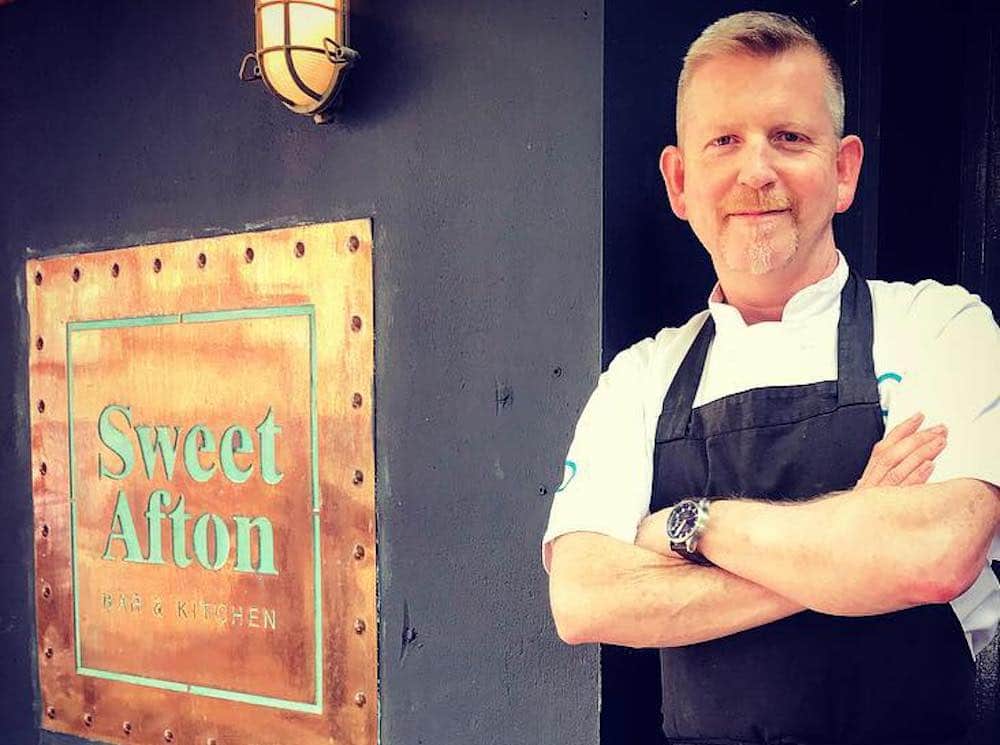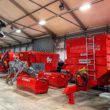
‘G’day,’ says Dean Coppard upon our introduction. As the old adage goes – you can take the man out of Australia but …
While Armagh is a long way from Dean’s native roots in North Queensland, home is where the heart is, and for the past 15 years that’s been right here in the Orchard County, where he made a name for himself with his award-winning restaurant Uluru.
Dean arrived in Armagh with his wife Sara in 2005, “with just a rucksack and a set of chef’s knives,” he explains, evoking a laid-back Aussie surfer mentality.
The intention was never to stay but Dean couldn’t have wished for a better start to his career, when he landed a job in Yellow Door’s flagship restaurant in Portadown under the mentorship of acclaimed chef Simon Dougan.
A couple of years later – in typical Irish fashion – his father-in-law just happened to mention a restaurant for sale in Armagh, and with that, Uluru Bistro was born.
“I think it was his way of keeping us here because we always intended to go back to Australia,” Dean admits. “Armagh is home now.”
The Michelin Guide recommended restaurant, that put Armagh on the culinary map, was renowned for using fresh local ingredients sourced from local producers, with Dean’s Australian stamp fused in every plate of food.
In 2016 Dean relocated the restaurant to a bigger premises and he sold the business to Gavin Emerson, but Mark McGonigle, who had been with Dean for 12 years, stayed on as executive chef over the revamped Uluru Bar and Grill – which maintains its Aussie style.
Meanwhile, the accolades followed Dean as he ended up as head chef at Sweet Afton Bar and Kitchen in Belfast, where he has excelled.
Sweet Afton won Best Gastro Pub in Ireland at the Yes Chef Industry Awards 2020.
Dean has clearly come a long way in his career but back in 2005 how did this ambitious Aussie come to the decision that an Australian-themed restaurant was exactly what was missing in Armagh?
“I don’t know that I thought it would work. It was a massive, massive gamble I ended up working for Simon Dougan in Yellow Door and I think that really helped. He was coming to fruition with that artisan style of food that Simon and Yellow Door is synonymous for. It’s very much local producers using the best quality ingredients they can. And I think working for him gave me a real understanding of what the Northern Irish palate was like,” he explains.
“I wanted to try and keep Uluru as close as possible to that Australian style neighbourhood bistro and I think that’s what we achieved. It was very much known as a fusion restaurant. The kangaroo and stuff like that was obviously a gimmick – I’m not going to lie. But I soon discovered that the people of Armagh, love game – venison, wood pigeon, pheasant. That was a real hit.”
Dean’s background certainly flavoured his expressive cooking, as he adapted to a completely different climate, with the four seasons featuring highly in his aesthetic.
“I grew up in North Queensland. It was 40 degrees. It was hot in the summer. It was hot in the winter. It was hot every day of the year. So, it was nice to have that real seasonal shift where it goes from bright spring and summer days into the autumn when the nights start coming in early. We had a fire in the original Uluru, and we’d have peat burning and that lovely smell around the restaurant.”
And Dean paints a mouthwatering picture of a restaurant experience that incorporates all the senses, starting with the name they came up with – Uluru – which is Aboriginal for Ayres Rock. “If you look at the rock, even over a day it will change in colour,” he explains.
“In the morning it’s bright orange and soft reds and as the sun starts to set at dusk it becomes this real deep red and purples come out. That was the whole emphasis on the restaurant.”
With no spring or autumn in his native land, Coppard’s incorporated Armagh’s climate into every aspect of Uluru.
“The restaurant would change seasonally and so would our food and our menu. So would the feel of the restaurant. During the day in the summertime it was light and airy, and we had windows open and rosemary and thyme growing in plant boxes and herbs like coriander growing at the windows. And then in wintertime the candles would come out and the fire was lit, and it became this warm comforting palace. We changed the paint as well. We’d go deep red in winter. The walls ended up with loads of layers and colours of paint. The food emphasised the mood and the season as well as the building itself.”
Australian food is really a melting pot of culture with a strong emphasis on Asian, Fijian and Tongan food around the coast where Dean hails from, “they’d do things like whole fish baked in banana leaves,” and Uluru’s specials board often reflected that.
“People would come just for those specials but then again it was a very short learning curve because I’d do things like whole baked seabass and I remember getting one sent back to the kitchen and the lady said ‘could you please take the head and tail off?’ because she didn’t like looking into the eyes of something she was about to eat. You’d never send food back to the kitchen in Australia asking the chef to take the head off the fish – it just doesn’t happen,” laughs Dean.
“But with things like that it was a learning curve and it stood me in good stead. After 15 years now I have a good knowledge of what works and what doesn’t work.”
Dean met his Armagh wife Sara on Bondi beach when they were both working in Sydney – a far cry from landlocked Armagh.
‘You’d do a split shift in Sydney and that would be 10 until 3 and at three o’clock you’d grab your board and go for a surf, have a quick shower and then go back to dinner at 5pm. That was the way we lived, right on Bondi beach. That’s how we sort of remember Australia, but everything changes for a reason.”
Having 10-year old daughter Mia and eight-year-old son Dylan settled in Armagh, is one good reason for staying put.
“The kids are at school and they have friends, and we have our friends here as well,” says Dean who naturally misses home mostly for family and friends – and of course warm-weather surfing.
The family were meant to be going to Australia for his parents fiftieth wedding anniversary in March, but the pandemic put paid to that just five days before their departure date.
“There were tears when the kids were told,” but these days keeping in touch is a lot easier than it was before.
“When I first came over years ago you got a phone card and you’d go to the phone box and put in a 25 digit pin number and that would get you through with three minutes of time.
But now, yesterday morning driving to school I Whatsapped my mother and did a video call and the kids had the phone in the back and they’re talking away to granny and grandad in Australia. And as for food – If I’m missing an Aussie Tim Tam biscuit, I can get it sent from the Aussie food shop in London.”
Dean’s life is in Armagh now, but he fears for the hospitality industry in these troubling times.
“The margins that restaurants and pubs work to are very, very tight. Restaurateurs who give their heart and soul will be in the kitchen or front of house. It’s very much a hands-on industry. It’s not just a job or an occupation, it’s a lifestyle. You have to immerse yourself in the business with a restaurant, a pub or a hotel, there are so many working parts to it,” he feels.
“With lockdown it does seem that restaurants and pubs and hospitality has been made a bit of a scapegoat.”
Dean believes that businesses are doing their utmost to comply with the rules and keep everyone safe. But there are still rates and rent to pay and food and drink is almost at ceiling price.
“Covid has really put a lot of pressure on country towns and cities. And I think we need to get back to that whole shopping local again,” which is nothing new for this chef.
“I still duck to the Shambles market and get my fish from his van on a Tuesday and Friday. You’ve got Connolly’s who have their fruit and veg down there. You go down and get potatoes that he’s just dug. It’s a bit more work with the dirt on the potatoes, but you wash them off and the flavour is fabulous. Bananas are a certain shape because that’s how the big multinationals deem their bananas to be, but when you get this amazing fruit and veg from a family farm the money is going back into the economy. I think people are becoming a lot more aware of that. The local suppliers in Armagh – it’s no secret – the food heartland is second to none. You’ve got cider producers you’ve got Ballylisk local cheese.
“I’ve won lots of awards over the years. I’ve been very blessed like that, but I have been recognised for my style of cooking. I am very passionate but at the start it was like ‘oh it’s the Aussie living in Northern Ireland’, but last year Sweet Afton won Best Gastro Pub in all of Ireland. That meant everything we were doing from cooking to service to front of house and using local produce is working. Customers are keen to know where their food comes from now. Like, that bit of beef that comes from down the road. They might know Dave the farmer who has reared that beef for however long. He gets money for that sale and then Dave’s son gets a new soccer kit for his football team.”
Apart from supporting local businesses and producers however, there has long been a problem recruiting young chefs in Northern Ireland and Dean feels the long unsociable hours are a lot to do with it.
To combat that he now tries to work his teams four days on and three days off for a healthy work life balance which the 47-year-old aspires to himself now, having ‘missed a lot of firsts’ with his children over the years.
“It is a tough, tough industry and it’s not appealing to young people. A lot of us more experienced chefs would be looking at the industry going ‘hang on, we can’t get chefs here, maybe it is broken.’ Maybe it’s how we’ve made it broken. Maybe we need to make sure young chefs are getting their time off and their mental health is ok.
“During lockdown I phoned all of my chefs once or twice a week and just checked in with them to make sure they’re alright. A lot of them were living with wives or partners and had family and kids. But one or two weren’t and they’re sitting on their own locked down by themselves. Coming from the social aspect of what we do to being locked down on your own with your own thoughts and just the TV to entertain you, it’s really tough on mental health. As much as we are trying to curb this virus and make sure there isn’t pressure on the NHS, there is also a big thing with mental health that we need to consider,” says Dean.
“We are staring down the barrel of Christmas now and we really are all in this together. It’s a tough industry and a tough time but the one thing about the hospitality industry is that we are really resilient. To stand there for 12 hours on your feet day in and day out, we can certainly fight the good fight in terms of Covid – fingers crossed.”





